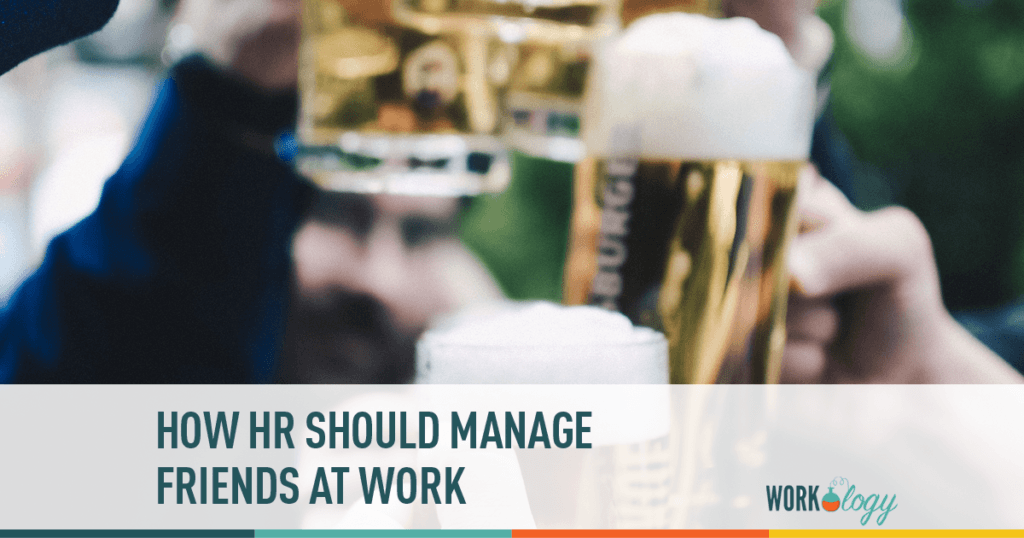Given that we often spend at least 40 hours per week at work, it is only natural that we form friendships there. This is not necessarily a problem when we are talking about friendships between peers; however, when you are both boss and friend, issues can come up.
The Pitfalls of Employee/Supervisor Friendships
Work friendships and friends at work help make our jobs a little more fun. It is also nice to go out with coworkers after a particularly stressful day. No one understands your venting at work like a coworker who deals with the same workplace issues. However, when you are the supervisor, it is not so easy to have work friends who fill this role in your life.
The employee/supervisor relationship is imbalanced when it comes to power. The supervisor has the authority to hire, promote, discipline and fire. Unlike the employee/supervisor relationship, healthy friendships do not involve one friend having authority over the other. It can be very difficult to tell your friend that they did not get a promotion or that their work performance is such that their job is in jeopardy.
When supervisors develop close friendships with employees, they may also send the wrong message. The employee may assume a certain level of job security because of the relationship, and other team members may think that the boss is playing favorites.
Social Media Friend Requests
Facebook and other social media sites have changed the scope of workplace friendships. As soon as we connect with someone on Facebook, we may get a lot of information about them that we did not know before. Prior to social media, when we first became friends with someone, it could take a while to learn all their likes, dislikes, interests and personality traits. Now, with a connection on Facebook, we may be flooded with all that information at once. What does this mean for an employee/supervisor friendship?
Supervisors need to be very careful about connecting with employees on social media sites. Some people share a lot on sites like Facebook. Just as in-person friendships can create a level of closeness that make things like disciplinary action and termination difficult, so too can online friendships.
In a Facebook friendship, you may learn personal details about someone that may fall into a protected class or protected activity. Suppose learning this information coincides with needing to take disciplinary action for work issues. Even if you were planning to take the action before learning protected information on Facebook, the employee could still make allegations that they were being targeted because of it. Sometimes it is better to intentionally stay in the dark about an employee’s personal life.
Ultimately you have to decide what is comfortable for you. I tend to advise supervisors to steer clear of online friendships with employees. I also think it is a bad idea for the supervisor to be the one initiating the request. Decide how you want to respond if an employee sends you a request, and remember it is OK to limit your online friendships to people you do not currently work with.
How to Set a Comfortable Boundary for Relationships at Work
It is fine to be friendly with employees, but be cautious in forming friendships. When it comes to relationships and friendships at work, be compassionate, caring and supportive, but figure out where the boundary is for you. Grabbing lunch with an employee or going to get coffee together on a break might be good, but it may cross the boundary too far into friendship if you agree to go out for drinks after work.
This also means accepting that part of being a manager is knowing that you won’t always be invited to do social things with your employees outside of work. Seek out work friendships with your peers. For those in small businesses, this can be a challenge because you may be the only manager at your company, which means it is important to make time for your non-work friends in order to get the social fulfillment you want in your life.








3 Comments
There is definitely the need of hour to draw proper distinction between social space and professional in offices. Your post is damn onto it. Interesting!
This is a very interesting article! As for me, the worst case scenario that can develop is when you are friends with your peers and then get promoted and suddenly become their boss. It’s confusing – just a moment ago you were a part of a team, and then you become the supervisor. In this case two types of relationships won’t last – either your friendship suffers or your professional reputation is affected.
This article might have been relevant 100 years ago. But the curiosities of managing Generation Y will mean you will not understand, attract or retain this massive class of worker by alienating them at arms length as a blanket rule.
Comments are closed.